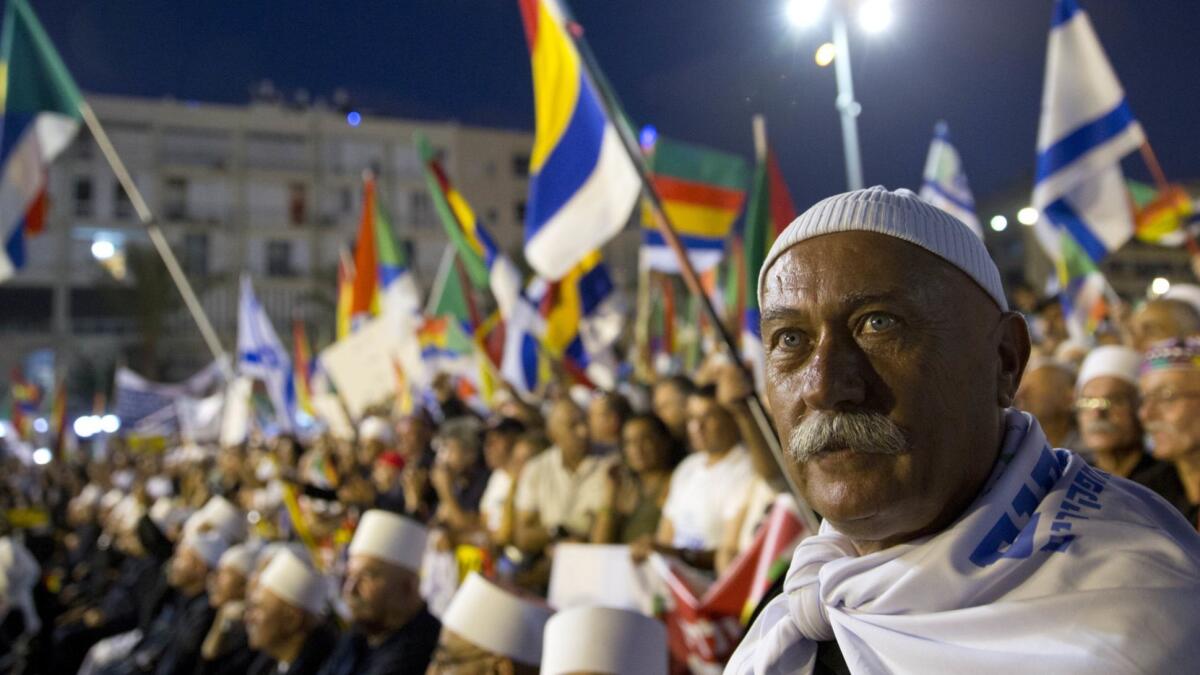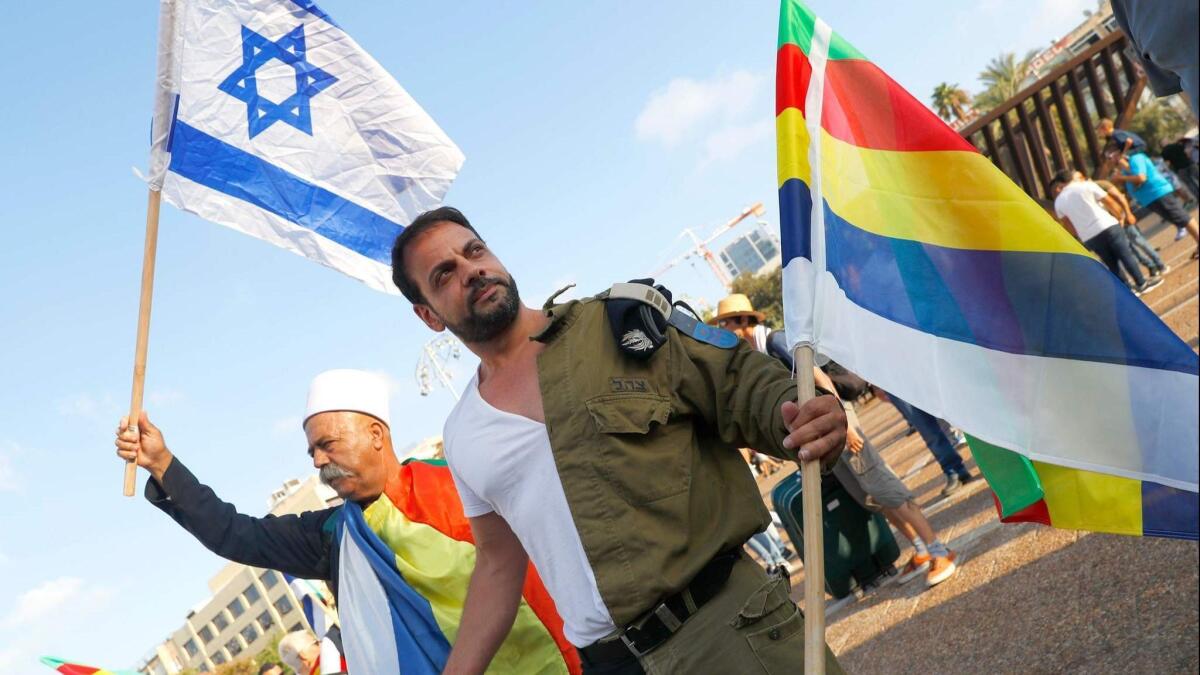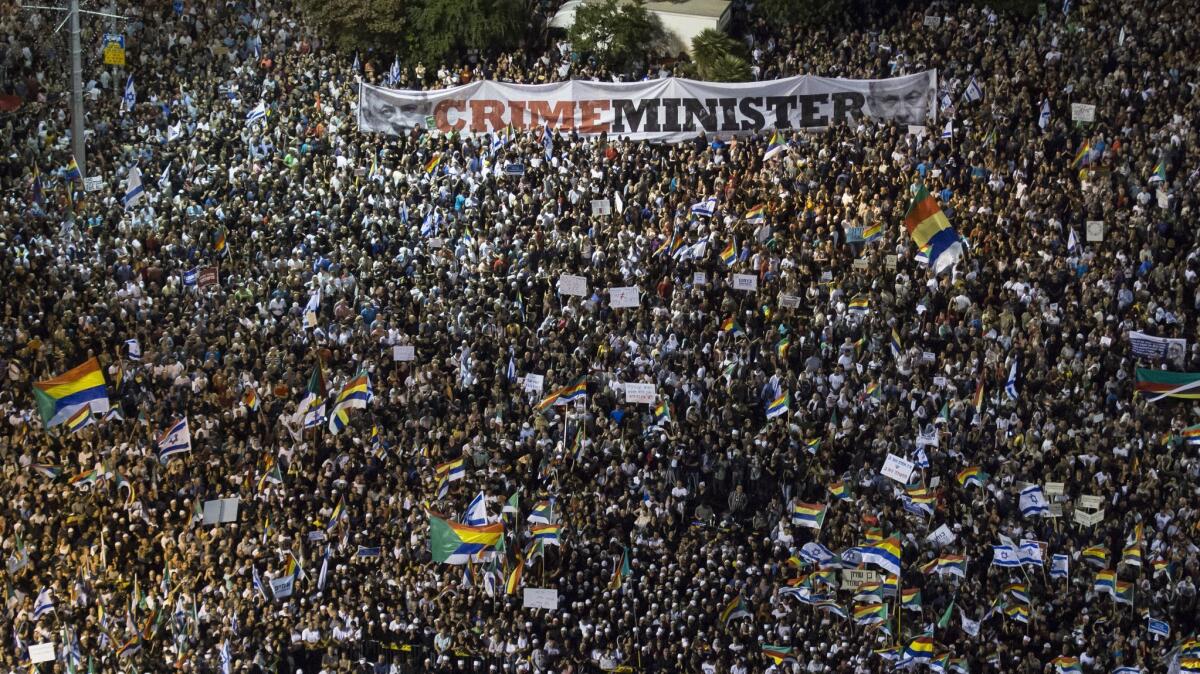Israel’s Druze say the country they helped create has turned its back on them

- Share via
Reporting from Tel Aviv — In the early dawn of July 20, a few hours after the Israeli parliament passed a divisive law defining the country as a Jewish state, Amal Asad reflected on what that law meant for him and people like him.
Like many Israelis, including members of Prime Minister Benjamin Netanyahu’s governing coalition, Asad was caught by surprise by the 3 a.m. vote that passed the nation-state law.
Asad is one of the Druze, members of a tiny, non-Muslim, monotheistic religion who hold a unique position in Israeli society, where they are known for fierce loyalty to the state. He also is a retired brigadier general.
Druze and Jews fight side by side in the military. Druze joined pre-state Jews in fighting for Israeli independence against the Arab League during the war of 1948. The new law, Asad thought, was just wrong: “There isn’t a single Jew in the state of Israel who hasn’t stood beside a Druze military grave.”
After all that sacrifice, how could his country turn against him? How, he and other Druze are asking, could their country pass such a law?
In some ways, the new nation-state law is straightforward. It echoes the 1947 United Nations resolution that predated Israel’s establishment and defines Israel as “the historic homeland of the Jewish people.”
But, veering into new legal territory, the law adds that Jews have “a singular right to national self-determination within it” and asserts that “the state sees the development of Jewish settlement as a national value.”
In a further insult, the law diminishes the status of Arabic from an official language to one with an undefined “special status.”
Arabic is the native language of the Druze and of Israel’s Muslim and Christian citizens, who together form more than 20% of the population.
The law has sparked worldwide condemnation, even from some of Israel’s closest allies. Internally, the nation-state law has brought Israel to the precipice of an existential crisis that Netanyahu appears not to have foreseen. Many of the critics denouncing the law cite its glaring effect on the Druze.
Asad, a veteran of almost 30 years in the Israeli army, said, “This law is the most painful blow I’ve received in my life, something I never thought I’d get from people with whom I served, alongside whom I was shot, with whom I’ve built this state.”
“A law telling me this state doesn’t belong to me?” Asad asked, incredulous. Referring to Druze who died serving in the Israeli military, he added, “Four hundred and fifty Druze gave their lives for the state and Bibi Netanyahu passes a law telling me the country doesn’t belong to me?”

Asad said “the government is completely detached from the people,” and he bet that Jewish Israelis — the vast majority in this country of 8.5 million — would stand alongside the Druze.
He announced a protest rally on Facebook, and on Saturday night, his gamble paid off. A vast crowd packed Tel Aviv’s Rabin Square under the banner of equality. Rally organizers claimed 250,000 people attended — about 100,000 more than there are Druze citizens of Israel.
For the first time in its history, the Jewish Federations of North America released a statement opposing a measure adopted by an Israeli government, stating it stands “shoulder to shoulder with the Druze community.”
“As strong supporters of Israel,” said the group, representing Jewish communities across the United States and Canada, “we were disappointed that the government passed legislation which was effectively a step back for all minorities.”
The moral insurrection against Netanyahu’s law spread from outraged Druze army officers to their fellow Jewish officers, hundreds of whom signed petitions opposing the measure, to the general public.
As the rally dispersed, Culture Minister Miri Regev relied on a tried-and-true Netanyahu tactic to dismiss the protest as “the left-wing camp still engaging in petty politics and trying to ignite a fire between the Druze community and the Israeli government.”
But it was unclear whether Israelis would accept her contention that retired members of Israel’s high command, who stood side by side on stage to close the rally with a rousing rendition of the national anthem, were leftist provocateurs.
“It’s too early to say,” said Netanyahu biographer Anshel Pfeffer, but “this rally was a success because it proved you can be patriotic and oppose the nation-state law. Netanyahu wanted to put out the message that anyone who’s against the law is anti-Zionist, but that may have backfired.”
Netanyahu, who enjoys a reputation as Israel’s “Mr. Security,” wanted a ruckus over the law, Pfeffer said, “something to show his base,” but he was unprepared for the implacable opposition of a group he cannot easily accuse of disloyalty to the state: its own army officers.
Israelis are beginning to ask if Netanyahu’s unerring political touch may have failed him as next year’s elections approach, and the future of Netanyahu’s signal legislative achievement is unclear.
“Bibi went one step too far,” Asad said. “No law can separate us. We are one people, Israelis. There isn’t a single Jew who hasn’t sat grieving with us over a fallen son. There’s no Druze who hasn’t cried over a Jewish grave. This was a cheap move to keep Netanyahu in power, a gift to his primary voters at the expense of the citizens of the state.”
Reversing the law would require at least 61 votes — an absolute majority — in the parliament, or Knesset.
Amnon Abramovich, an expert analyst of Israeli politics, said on the Kann News television channel that Netanyahu “is willing to destroy the foundations of this country for primary votes — pure cynicism.”
In a furious column, the renowned author David Grossman, whose son Uri was killed during the 2006 Lebanon war, accused Netanyahu of treason.
In an extraordinary statement posted last week, after a number of army officers ostentatiously quit their posts to protest the law, Israeli army Chief of Staff Lt. Gen. Gadi Eisenkot appeared to remove the military from the law’s jurisdiction by confirming that “the peoples’ army, whose mission it is to safeguard the security of the people of Israel and to win wars, is bound to uphold human dignity, regardless of ethnicity, religion and sex.”
Israel’s public sphere has been awash with anguished individual cries. In Yediot Ahronot, Israel’s mass-market tabloid, columnist Yoav Keren published a public apology to fallen Israel Defense Forces commanders.
A photograph of Lt. Col. Hussein Amar, commander of the 12th “Barak” battalion of the army’s elite’s Golani Brigade, accompanied Keren’s column. Amar, who was killed in action in Lebanon in 1996, was Druze.
Joel Dagan, who as a soldier served under Amar, posted a tormented plea on Facebook asking for the “personal forgiveness” of Amar’s family, adding, “Today, I am ashamed to be a Jew.”

Citing Israel’s declaration of independence, its foundational legal document, Dagan wrote that “the state of Israel is ‘the state of all its citizens without regard to religion, race or sex.’ If this is the law of the land, I am not a law-abiding citizen!”
One of Amar’s surviving brothers, Nabil, himself a veteran of an elite army unit, attended the Saturday rally. He said he’d felt “stabbed in the heart” by the law.
Observing the ocean of Israelis at the protest, he breathed a sigh of relief.
Tarnopolsky is a special correspondent.
More to Read
Sign up for Essential California
The most important California stories and recommendations in your inbox every morning.
You may occasionally receive promotional content from the Los Angeles Times.










